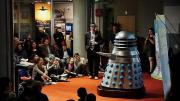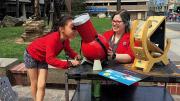The twelfth annual Cambridge Science Festival offers more than 200 events, promising something for all ages—“Science Carnival and Robot Zoo,” “Astronomy on Tap,” “You’re the Expert”—in locations across Greater Boston. Founded by MIT Museum director John Durant, the 10-day event was the “first of its kind in the United States,” says festival manager MaryCat Chaikin: “You get to engage in hands-on, creative activities directly with scientists” working in a world-class research hub.
Also unique is the fair’s breadth, from math challenges, lab experiments, citizen-driven data drives, and philosophical debates to activities that underscore the essential roles of math and science in food, the arts, business, education, human development—and even comedy. “You’re the Expert” is a hilarious attempt by comedians to guess scientists’ areas of research through a 20 Questions-style game. The Boston Public Market hosts a daylong focus on science and edibles, while Red’s Best opens its Boston fishery to explain technologies used by sustainable seafood markets. At “Be A Medicine Hunter,” the Novartis open house, visitors can talk with researchers; meanwhile, the City of Cambridge offers “How Cambridge Works—Science at City Hall.” Harvard events range from “Cambridge Explores the Universe,” at the Harvard-Smithsonian Center for Astrophysics, to “The Invisible Chef”—ferreting out microbes in food with the Harvard Microbial Sciences Initiative.
Most activities are free, accessible by public transportation, and open to families. But it’s adults-only at “Astronomy on Tap,” where postdocs present their research over pints. The challenge mounts as the night wears on.









